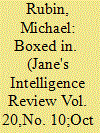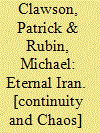| Srl | Item |
| 1 |
ID:
085058


|
|
|
| 2 |
ID:
071933


|
|
|
|
|
| Publication |
Hampshire, Palgrave Macmillan, 2005.
|
| Description |
ix, 203p.pbk
|
| Standard Number |
1403962766
|
|
|
|
|
|
|
|
|
|
|
|
Copies: C:1/I:0,R:0,Q:0
Circulation
| Accession# | Call# | Current Location | Status | Policy | Location |
| 051295 | 955/CLA 051295 | Main | On Shelf | General | |
|
|
|
|
| 3 |
ID:
146169


|
|
|
|
|
| Summary/Abstract |
Good diplomacy goes hand-in-hand with good intelligence. Just as courtroom lawyers never ask a question to which they do not already know the answer, so too should politicians and diplomats avoid negotiating with enemies without first understanding what they bring to the table and what they seek to conceal. Because rogue regimes are among America's most opaque and dangerous adversaries,1 a breakthrough in relations can define a President's legacy and make diplomats’ careers. Too often, the temptation to succeed can be overwhelming. When intelligence clashes with political and diplomatic goals, the sanctity of intelligence often loses: seldom do Presidents want their diplomatic initiatives to be the sacrifice.
|
|
|
|
|
|
|
|
|
|
|
|
|
|
|
|
| 4 |
ID:
132155


|
|
|
|
|
| Publication |
2014.
|
| Summary/Abstract |
Meeting her Russian counterpart Sergei Lavrov for the first time as secretary of state, Hillary Clinton famously presented him with a red, plastic "reset" button. "We want to reset our relationship and so we will do it together," she explained, adding, "We worked hard to get the right Russian word. Do you think we got it?" "You got it wrong," Lavrov responded.
The problem, in hindsight, was less a botched translation than it was a misunderstanding of the Russian mind. Like too many presidents and secretaries of state before them, President Obama and Secretary Clinton assumed that the problems hampering relations lay more with their predecessors than with America's adversaries. Obama and Clinton were more willing to blame President George W. Bush and Vice President Dick Cheney for what Obama caricatured as knee-jerk hostility to diplomacy with Russia than President Vladimir Putin himself. Putin took full advantage of this mistake.
|
|
|
|
|
|
|
|
|
|
|
|
|
|
|
|
| 5 |
ID:
181250


|
|
|